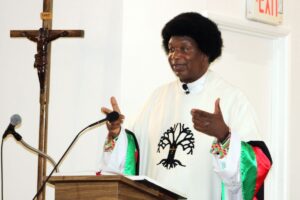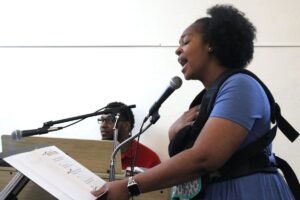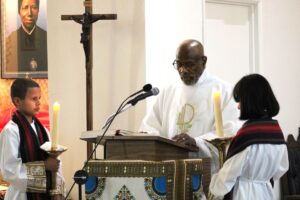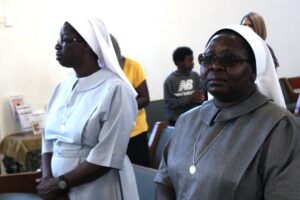For the first time in the Diocese of Phoenix, Catholics celebrated a Mass honoring Juneteenth — the commemoration of when the last slaves were freed following the Civil War — at St. Josephine Bakhita Mission Parish in Phoenix on June 19.
Although President Abraham Lincoln issued the Emancipation Proclamation on Jan. 1, 1863, freeing all slaves within those states that had seceded, it wasn’t until June 19, 1865, at the end of the war, when Major General Gordon Granger and the Union soldiers arrived in Galveston, Texas, to enforce it, thus freeing the last of the slaves in the former Confederate States. Juneteenth, also known as Freedom Day or Emancipation Day, has been celebrated since 1866 but it wasn’t recognized as a federal holiday until President Joe Biden signed it into law in 2021.

In his homily for the Mass, St. Josephine pastor Fr. Andrew McNair, who is also the director of Black Catholic Ministry for the Diocese of Phoenix, noted that while Juneteenth is not a liturgical feast day, it’s still important to celebrate.
“As a people of God, may we celebrate always God’s revealed truths. And one of those truths that I never want you to forget is that God created you free,” he said. “It is right and just as a people of God that we celebrate the fact that God created us free, free to love Him, free to serve Him, free to live in His creation.”
If we are created in His image and likeness, the pastor said, then we are required to treat others as such, viewing them with compassion and mercy.
“When we begin to treat the other as less, that’s when we began to convert the other into some type of commodity that we don’t recognize their dignity as sons and daughters of the Almighty,” said Fr. McNair. “Juneteenth is an opportunity to recognize that dignity and to decide — each one of us, beginning with myself — I must do better. I must treat my brother and sister better, knowing that they are sacred to the Lord.”
He then exhorted the congregation that if Christians are redeemed by the Blood of Jesus, we cannot remain silent. Rather, we should work for the freedom of all, especially Catholics.
“I was taught that the Catholic Church enjoys the fullness of Christian revelation. If that is the case, then it’s on us to step up, to be the first to defend our brothers and sisters in need, to be the first to help those that cannot help themselves,” he said. “May we continue the struggle. Not everyone is free, and until everyone is free, none of us are truly completely free.”
He closed his homily by asking for the intercession of the parish patroness, St. Josephine Bakhita, who is the patroness of human trafficking.

During the liturgy, the parish’s adult Gospel choir, the Freedom Singers, joined together with the Umoja Youth Choir. Cory Dugar accompanied the choirs on the piano, remarking that Juneteenth represents freedom and liberation for him.
“When I played today, I tried my best to exude freedom and expression through my playing, and I hope everybody felt that because today is a day to celebrate that freedom,” he said. “Also, I look at the spiritual side of it because sometimes we have been bound to sin but now we’re free through Jesus. We’re liberated. It symbolizes freedom and liberation for all God’s people.”
Parishioner Victoria Valdez attended the Mass with her two children while her husband accompanied the choir by playing the drums. She shared the importance of celebrating Juneteenth as a Catholic.
“As a Catholic, one of the really important parts is being pro-life, and I think that’s a big part of it, to end slavery of all kinds, human trafficking, everything,” she said. “It’s unbelievable that it just two years ago became a federal holiday. It’s insane.”

Deacon Lorenzo McKnight remembers attending segregated schools in Forrest City, Arkansas, just west of Memphis, Tennessee, all the way through his high school graduation in 1966. He still remembers the segregated water fountains and restaurants commonplace in the South at the time as a result of Jim Crow laws. He described assisting at the liturgy as a “privilege.”
“I didn’t go to school with other races. I wasn’t in an integrated situation until I joined the Navy,” said the deacon. “It’s not totally gone. We’re on a journey, and only God knows where it will end.”
Sister of the Sacred Heart of Jesus Betty Banja, who serves in the Catholic Charities Refugee Resettlement Program, also attended the liturgy. Originally from the Sudan — the birthplace of St. Josephine and where her religious community was founded — Sr. Betty reflected on the freedom from bondage Juneteenth represents.

“I look at the faith of God that brought understanding to people, to free the slaves, to know that they are also children of God, to know that they are all created as humans, to have dignity and to be respected,” she said. “I’m just so happy that this day is being organized and being celebrated, and it is a federal public holiday. This makes everybody to give thanks to God that we have realized that we are one, and nobody is a slave, anymore. We are all free children of God.”
Bishop Joseph N. Perry, auxiliary bishop of Chicago and chairman of the U.S. Conference of Catholic Bishops’ Subcommittee on African American Affairs, also released a video on Juneteenth reflecting on the holiday.
“Juneteenth is a time to commemorate the end of slavery, to reflect on the history and legacy of racism in our country, as well as to underscore our commitment as religiously grounded people to do better,” the bishop said. “We must remain relentless in our pursuit of both equality and equity.”







